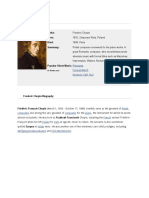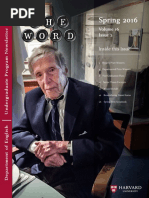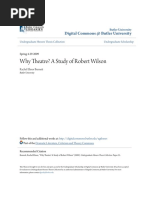0 ratings0% found this document useful (0 votes)
38 viewsSubmitted By: Submitted To: Aries D. Marzo Mrs. Editha Pagcaliwangan
Submitted By: Submitted To: Aries D. Marzo Mrs. Editha Pagcaliwangan
Uploaded by
Shin MarshThe document provides brief biographies of 9 famous classical composers:
- Ludwig van Beethoven, a pivotal German composer known for his 9 symphonies and influence on classical and romantic music.
- Johannes Brahms, a German composer and pianist who composed for orchestra, chamber ensembles, and voice.
- Hector Berlioz, a French romantic composer best known for Symphonie Fantastique and his contributions to orchestration.
- Peter Ilyich Tchaikovsky, a renowned Russian composer of symphonies, ballets, and other works popular in the classical repertoire.
- Franz Liszt, a 19th century Hungarian virtuoso pianist and influential composer
Copyright:
© All Rights Reserved
Available Formats
Download as DOCX, PDF, TXT or read online from Scribd
Submitted By: Submitted To: Aries D. Marzo Mrs. Editha Pagcaliwangan
Submitted By: Submitted To: Aries D. Marzo Mrs. Editha Pagcaliwangan
Uploaded by
Shin Marsh0 ratings0% found this document useful (0 votes)
38 views11 pagesThe document provides brief biographies of 9 famous classical composers:
- Ludwig van Beethoven, a pivotal German composer known for his 9 symphonies and influence on classical and romantic music.
- Johannes Brahms, a German composer and pianist who composed for orchestra, chamber ensembles, and voice.
- Hector Berlioz, a French romantic composer best known for Symphonie Fantastique and his contributions to orchestration.
- Peter Ilyich Tchaikovsky, a renowned Russian composer of symphonies, ballets, and other works popular in the classical repertoire.
- Franz Liszt, a 19th century Hungarian virtuoso pianist and influential composer
Original Description:
cc
Original Title
Composers
Copyright
© © All Rights Reserved
Available Formats
DOCX, PDF, TXT or read online from Scribd
Share this document
Did you find this document useful?
Is this content inappropriate?
The document provides brief biographies of 9 famous classical composers:
- Ludwig van Beethoven, a pivotal German composer known for his 9 symphonies and influence on classical and romantic music.
- Johannes Brahms, a German composer and pianist who composed for orchestra, chamber ensembles, and voice.
- Hector Berlioz, a French romantic composer best known for Symphonie Fantastique and his contributions to orchestration.
- Peter Ilyich Tchaikovsky, a renowned Russian composer of symphonies, ballets, and other works popular in the classical repertoire.
- Franz Liszt, a 19th century Hungarian virtuoso pianist and influential composer
Copyright:
© All Rights Reserved
Available Formats
Download as DOCX, PDF, TXT or read online from Scribd
Download as docx, pdf, or txt
0 ratings0% found this document useful (0 votes)
38 views11 pagesSubmitted By: Submitted To: Aries D. Marzo Mrs. Editha Pagcaliwangan
Submitted By: Submitted To: Aries D. Marzo Mrs. Editha Pagcaliwangan
Uploaded by
Shin MarshThe document provides brief biographies of 9 famous classical composers:
- Ludwig van Beethoven, a pivotal German composer known for his 9 symphonies and influence on classical and romantic music.
- Johannes Brahms, a German composer and pianist who composed for orchestra, chamber ensembles, and voice.
- Hector Berlioz, a French romantic composer best known for Symphonie Fantastique and his contributions to orchestration.
- Peter Ilyich Tchaikovsky, a renowned Russian composer of symphonies, ballets, and other works popular in the classical repertoire.
- Franz Liszt, a 19th century Hungarian virtuoso pianist and influential composer
Copyright:
© All Rights Reserved
Available Formats
Download as DOCX, PDF, TXT or read online from Scribd
Download as docx, pdf, or txt
You are on page 1of 11
Submitted by: Submitted to:
Aries D. Marzo Mrs. Editha Pagcaliwangan
Ludwig van Beethoven was a German composer and pianist. A crucial figure in the
transition between the Classical and Romantic eras inWestern art music, he remains
one of the most famous and influential of all composers. His best-known compositions
include 9symphonies, 5 concertos for piano, 32 piano sonatas, and 16 string quartets.
He also composed other chamber music, choral works (including the celebrated Missa
solemnis), and songs.
Born in Bonn, then the capital of the Electorate of Cologne and part of the Holy Roman
Empire, Beethoven displayed his musical talents at an early age and was taught by his
father Johann van Beethoven and by Christian Gottlob Neefe. During his first 22 years
in Bonn, Beethoven intended to study with Wolfgang Amadeus Mozart and
befriended Joseph Haydn. Beethoven moved to Vienna in 1792 and began studying
with Haydn, quickly gaining a reputation as a virtuoso pianist. He lived in Vienna until
his death. In about 1800 his hearing began to deteriorate, and by the last decade of his
life he was almost totally deaf. He gave up conducting and performing in public but
continued to compose; many of his most admired works come from this period.
Johannes Brahms was a German composer and pianist. Born in Hamburg into
a Lutheranfamily, Brahms spent much of his professional life in Vienna, Austria. In his
lifetime, Brahms's popularity and influence were considerable. He is sometimes grouped
with Johann Sebastian Bach and Ludwig van Beethoven as one of the "Three Bs", a
comment originally made by the nineteenth-century conductor Hans von Blow.
Brahms composed for piano, chamber ensembles, symphony orchestra, and for voice
and chorus. A virtuoso pianist, he premiered many of his own works; he worked with
some of the leading performers of his time, including the pianist Clara Schumann and
the violinist Joseph Joachim (the three were close friends). Many of his works have
become staples of the modern concert repertoire. Brahms, an uncompromising
perfectionist, destroyed some of his works and left others unpublished.
Hector Berlioz was a French Romantic composer, best known for his
compositions Symphonie fantastique and Grande messe des morts (Requiem). Berlioz
made significant contributions to the modern orchestra with his Treatise on
Instrumentation. He specified huge orchestral forces for some of his works, and
conducted several concerts with more than 1,000 musicians.
[2]
He also composed
around 50 songs. His influence was critical for the further development of Romanticism,
especially in composers like Richard Wagner, Nikolai Rimsky-Korsakov, Franz
Liszt, Richard Strauss, Gustav Mahler and many others.
Peter Ilyich Tchaikovsky was a Russian composer whose works
included symphonies,concertos, operas, ballets, chamber music, and a choral setting of
the Russian Orthodox Divine Liturgy. Some of these are among the most popular
theatrical music in the classical repertoire. He was the first Russian composer whose
music made a lasting impression internationally, which he bolstered with appearances
as a guest conductor later in his career in Europe and the United States. One of these
appearances was at the inaugural concert of Carnegie Hall in New York City in 1891.
Tchaikovsky was honored in 1884 by Emperor Alexander III, and awarded a lifetime
pension in the late 1880s.
Although musically precocious, Tchaikovsky was educated for a career as a civil
servant. There was scant opportunity for a musical career in Russia at that time, and no
system of public music education. When an opportunity for such an education arose, he
entered the nascent Saint Petersburg Conservatory, from which he graduated in 1865.
The formal Western-oriented teaching he received there set him apart from composers
of the contemporary nationalist movement embodied by the Russian composers of The
Five, with whom his professional relationship was mixed.
Franz Liszt was a 19th-centuryHungarian composer, virtuoso pianist, conductor,
teacher and Franciscan tertiary. Liszt gained renown in Europe during the early
nineteenth century for his virtuosic skill as a pianist. He was said by his contemporaries
to have been the most technically advanced pianist of his age, and in the 1840s he was
considered to be the greatest pianist of all time. Liszt was also a well-known and
influential composer, piano teacher and conductor. He was a benefactor to other
composers, includingRichard Wagner, Hector Berlioz, Camille Saint-Sans, Edvard
Grieg and Alexander Borodin.
Frdric Franois Chopin was a Polish composer and virtuoso pianist of
the Romantic era, who wrote primarily for the solo piano. He gained and has maintained
renown worldwide as one of the leading musicians of his era, whose "poetic genius was
based on a professional technique that was without equal in his generation."
[1]
Chopin
was born in what was then the Duchy of Warsaw, and grew up in Warsaw, which after
1815 became part of Congress Poland. A child prodigy, he completed his musical
education and composed many of his works in Warsaw before leaving Poland, aged 20,
less than a month before the outbreak of the November 1830 Uprising.
At the age of 21 he settled in Paris. Thereafter, during the last 18 years of his life, he
gave only some 30 public performances, preferring the more intimate atmosphere of
the salon. He supported himself by selling his compositions and teaching piano, for
which he was in high demand. Chopin formed a friendship with Franz Liszt and was
admired by many of his musical contemporaries, including Robert Schumann. In 1835
he obtained French citizenship. After a failed engagement to a Polish girl, from 1837 to
1847 he maintained an often troubled relationship with the French writer George Sand.
A brief and unhappy visit to Majorca with Sand in 183839 was one of his most
productive periods of composition. In his last years, he was financially supported by his
admirer Jane Stirling, who also arranged for him to visit Scotlandin 1848. Through most
of his life, Chopin suffered from poor health. He died in Paris in 1849, probably
of tuberculosis.
Franz Peter Schubert was an Austrian composer.Despite dying at age thirty-one,
Schubert was extremely prolific. His output consists of over six hundred secular vocal
works (mainly Lieder), seven complete symphonies, sacred music, operas, incidental
music and a large body of chamber and piano music. Appreciation of his music while he
was alive was limited to a relatively small circle of admirers in Vienna, but interest in his
work increased significantly in the decades following his death.Felix
Mendelssohn, Robert Schumann, Franz Liszt, Johannes Brahms and other 19th-century
composers discovered and championed his works. Today, Schubert is ranked among
the greatest composers of the late Classical era and early Romantic era and is one of
the most frequently performed composers of the early nineteenth century.
Robert Schumann was a German composer and influential music critic. He is widely
regarded as one of the greatest composers of the Romantic era. Schumann left the
study of law, intending to pursue a career as a virtuoso pianist. He had been assured by
his teacher Friedrich Wieck that he could become the finest pianist in Europe, but a
hand injury ended this dream. Schumann then focused his musical energies on
composing.
Schumann's published compositions were written exclusively for the piano until 1840;
he later composed works for piano and orchestra; many Lieder (songs for voice and
piano); four symphonies; an opera; and other orchestral, choral, and chamber works.
Works such asKinderszenen, Album fr die Jugend, Blumenstck, Sonatas and
Albumbltter are among his most famous. His writings about music appeared mostly in
the Neue Zeitschrift fr Musik (New Journal for Music), a Leipzig-based publication
which he jointly founded.
Wilhelm Richard Wagner was a German composer, theatre director, polemicist, and
conductor who is primarily known for his operas (or, as some of his later works were
later known, "music dramas"). Unlike most opera composers, Wagner wrote both
the libretto and the music for each of his stage works. Initially establishing his reputation
as a composer of works in the romantic vein of Weber and Meyerbeer, Wagner
revolutionised opera through his concept of theGesamtkunstwerk ("total work of art"), by
which he sought to synthesise the poetic, visual, musical and dramatic arts, with music
subsidiary to drama, and which was announced in a series of essays between 1849 and
1852. Wagner realised these ideas most fully in the first half of the four-opera cycle Der
Ring des Nibelungen (The Ring of the Nibelung).
You might also like
- Notable Composers in Western Music: SparkChartsDocument6 pagesNotable Composers in Western Music: SparkChartsElizabeth Alarcón-GaxiolaNo ratings yet
- Robert Schumann (8 June 1810 - 29 July 1856) - Was ADocument5 pagesRobert Schumann (8 June 1810 - 29 July 1856) - Was AShang BugayongNo ratings yet
- Music Notes 9 Q3Document8 pagesMusic Notes 9 Q3gregdevera9No ratings yet
- Wolfgang Amadeus Mozart: Anna Maria Leopold MozartDocument6 pagesWolfgang Amadeus Mozart: Anna Maria Leopold MozartJanelle LumactodNo ratings yet
- Romantic PeriodDocument6 pagesRomantic PeriodShy ManzanoNo ratings yet
- Wolfgang Amadeus Mozart Was One of The Most Significant and Influential of AllDocument1 pageWolfgang Amadeus Mozart Was One of The Most Significant and Influential of AlljasMine jAsMiNeNo ratings yet
- BayotmeruiDocument25 pagesBayotmeruiblairemeri09No ratings yet
- Elegant Education Pack For StudentsDocument21 pagesElegant Education Pack For Studentsridleydelrosario0No ratings yet
- Performance Task in MapehDocument11 pagesPerformance Task in MapehAva BarramedaNo ratings yet
- Jean Rien C. Armenion ABComm. 111-ADocument7 pagesJean Rien C. Armenion ABComm. 111-AnerakyojNo ratings yet
- Music Reading Material G9Document5 pagesMusic Reading Material G9Ethel Marie Casido BurceNo ratings yet
- 10 Classical Music ComposersDocument4 pages10 Classical Music ComposersRochelle Faye AclagNo ratings yet
- G 10 AA ReportDocument23 pagesG 10 AA ReportSarah J LeonorNo ratings yet
- TournamenttournamentDocument4 pagesTournamenttournamentSunny YuNo ratings yet
- Music9 AsDocument2 pagesMusic9 AsLyza SuribenNo ratings yet
- 3rdQ MusicDocument22 pages3rdQ MusicKent Kyle PalingcodNo ratings yet
- Lesson 2 SardualDocument16 pagesLesson 2 Sardualgwenchana112001No ratings yet
- Mapeh-presentation- (2)Document28 pagesMapeh-presentation- (2)Nate Archibald Crescencio CasiusNo ratings yet
- Art AssignDocument13 pagesArt Assigndempearl2315No ratings yet
- Sin Título 1Document1 pageSin Título 1Marian StefanovaNo ratings yet
- Music 9: Full Name Grade and Section Date SubmittedDocument9 pagesMusic 9: Full Name Grade and Section Date SubmittedLovely Jane CanabatuanNo ratings yet
- MAPEHHHDocument18 pagesMAPEHHHGay For anime girlzNo ratings yet
- Music Lesson 9 Piano and Virtuoso PianistDocument16 pagesMusic Lesson 9 Piano and Virtuoso PianistRheanna BaquillerNo ratings yet
- Ludwig Van BeethovenDocument12 pagesLudwig Van Beethovenanghie28No ratings yet
- Art Song PresentationDocument28 pagesArt Song PresentationTimothy Tavita23No ratings yet
- Frederic ChopinDocument8 pagesFrederic ChopinRoyke JRNo ratings yet
- Topic 7Document6 pagesTopic 7gheralfredNo ratings yet
- Reporter: John G.Sinang BSE III-B Title of The Report: Unit XVI: The Nineteenth-Century Art Song, The Romantic SongDocument4 pagesReporter: John G.Sinang BSE III-B Title of The Report: Unit XVI: The Nineteenth-Century Art Song, The Romantic Songfinalfantasy_cireNo ratings yet
- Baroque MusicDocument24 pagesBaroque Musicpao manaligodNo ratings yet
- Music of The Romantic PeriodDocument64 pagesMusic of The Romantic PeriodSofia PojasNo ratings yet
- The Romantic Period, 1820-1910: Composers To Be CoveredDocument3 pagesThe Romantic Period, 1820-1910: Composers To Be CoveredBrick 'GuvnorNo ratings yet
- Classical Music ComposersDocument3 pagesClassical Music ComposersAnabelle Pandac PerezNo ratings yet
- Music History 9Document20 pagesMusic History 9Pat P. MonteNo ratings yet
- Romantic Person ComposersDocument7 pagesRomantic Person ComposersFretxie mae BoholstNo ratings yet
- 1st Arts and Music (Third Module) MINIMIZEDDocument13 pages1st Arts and Music (Third Module) MINIMIZEDDennmark IgutNo ratings yet
- MusicDocument30 pagesMusicnicaNo ratings yet
- Music in The Twentieth Century: Group 1: Iv - St. AmbroseDocument8 pagesMusic in The Twentieth Century: Group 1: Iv - St. AmbrosePat CorderoNo ratings yet
- Ludwig Van Beethoven Nacio El 16 de Diciembre de 1827: Was A German Composer, Conductor, Pianist and Piano TeacherDocument3 pagesLudwig Van Beethoven Nacio El 16 de Diciembre de 1827: Was A German Composer, Conductor, Pianist and Piano TeacherSteven RamosNo ratings yet
- Composer of Month Update 2011Document20 pagesComposer of Month Update 2011Maja Nikolovski MihajlovicNo ratings yet
- Chopin - Wikipedia BioDocument1 pageChopin - Wikipedia BioKuertonNo ratings yet
- Franz Peter Schubert: Claire Gui Band VDocument16 pagesFranz Peter Schubert: Claire Gui Band VMarko AskovicNo ratings yet
- Music of The Romantic PeriodDocument49 pagesMusic of The Romantic PeriodERLI CADUNGOGNo ratings yet
- Music History (Classical Period)Document4 pagesMusic History (Classical Period)May-Ann AleNo ratings yet
- Comprehensive NotesDocument8 pagesComprehensive NoteschristfrenettebrionesNo ratings yet
- Presentation of Group 4 Ver.2 1Document31 pagesPresentation of Group 4 Ver.2 1Mark Jhon Doctora IINo ratings yet
- Late Romantic PeriodDocument14 pagesLate Romantic PeriodSanduni HansamaliNo ratings yet
- Music of Romantic PeriodDocument38 pagesMusic of Romantic PeriodElmer John De Leon100% (1)
- 3RD Music 1 Week Music of The Romantic PeriodDocument50 pages3RD Music 1 Week Music of The Romantic PeriodAnthony Joshua LugtuNo ratings yet
- Book of ComposerjpDocument4 pagesBook of Composerjpbryanatencio82No ratings yet
- The Romantic ComposersDocument8 pagesThe Romantic ComposersreubenvillanezaNo ratings yet
- Music of The Romantic PeriodDocument13 pagesMusic of The Romantic PeriodKarl LazagaNo ratings yet
- The Viennese Classic Period - Chap20Document24 pagesThe Viennese Classic Period - Chap20Ju DyNo ratings yet
- 3RD Music 1 Week Music of The Romantic Period PDFDocument50 pages3RD Music 1 Week Music of The Romantic Period PDFAmira TerminezNo ratings yet
- Music NotesDocument4 pagesMusic NotesAeron YbanezNo ratings yet
- Music of The Romantic Period 1820 1910Document12 pagesMusic of The Romantic Period 1820 1910Ri-ann VinculadoNo ratings yet
- Robert SchumannDocument8 pagesRobert SchumannVhany Aron AcasioNo ratings yet
- MUSIC - Dec. 4-5. From Classical To Romantic PeriodDocument22 pagesMUSIC - Dec. 4-5. From Classical To Romantic Periodjajatiwing27No ratings yet
- Classical PipsDocument4 pagesClassical Pipscharice maanoNo ratings yet
- 3RD Music 1 Week Music of The Romantic Period PDFDocument50 pages3RD Music 1 Week Music of The Romantic Period PDFAnthony Joshua LugtuNo ratings yet
- Intra-Car Multi-Hop Wireless Sensor Networking: A Case StudyDocument21 pagesIntra-Car Multi-Hop Wireless Sensor Networking: A Case StudyShin MarshNo ratings yet
- 90e PDFDocument27 pages90e PDFShin MarshNo ratings yet
- Speaker CertDocument1 pageSpeaker CertShin MarshNo ratings yet
- 3-Components of The Network:: Communication and Computer Networks The Lecturer: Ahmed BadriDocument4 pages3-Components of The Network:: Communication and Computer Networks The Lecturer: Ahmed BadriShin MarshNo ratings yet
- Start: Input Student Number G1, G2, G3Document1 pageStart: Input Student Number G1, G2, G3Shin MarshNo ratings yet
- 02 Geom ShinDocument13 pages02 Geom ShinShin MarshNo ratings yet
- Lecture1 Mathematical ModelingDocument23 pagesLecture1 Mathematical ModelingShin MarshNo ratings yet
- Derivational Part of Speech NounDocument2 pagesDerivational Part of Speech NounShin MarshNo ratings yet
- Phon E1 Phon E2: Musi C Line in FM Heads Et Musi CDocument1 pagePhon E1 Phon E2: Musi C Line in FM Heads Et Musi CShin MarshNo ratings yet
- College of Engineering, Architecture and Fine Arts ECE/ICE/MEXE DepartmentDocument4 pagesCollege of Engineering, Architecture and Fine Arts ECE/ICE/MEXE DepartmentShin MarshNo ratings yet
- Table 2.4 Input Signal Frequenc y (HZ) 10 100 200 500 800 1k 2k 5k 10k 100kDocument2 pagesTable 2.4 Input Signal Frequenc y (HZ) 10 100 200 500 800 1k 2k 5k 10k 100kShin MarshNo ratings yet
- Table 2.5: Input Signal Frequenc y (HZ) 10 100 200 500 800 1k 2k 5k 8k 10k 50k 100kDocument3 pagesTable 2.5: Input Signal Frequenc y (HZ) 10 100 200 500 800 1k 2k 5k 8k 10k 50k 100kShin MarshNo ratings yet
- Table 2.3 Input Signal Frequenc y (HZ) 10 100 1k 2k 5k 8k 10k 20k 50k 100kDocument2 pagesTable 2.3 Input Signal Frequenc y (HZ) 10 100 1k 2k 5k 8k 10k 20k 50k 100kShin MarshNo ratings yet
- Table 2.1 Input Signal Frequenc y (HZ) 10 100 1k 2k 5k 8k 10k 20k 50k 100kDocument2 pagesTable 2.1 Input Signal Frequenc y (HZ) 10 100 1k 2k 5k 8k 10k 20k 50k 100kShin MarshNo ratings yet
- MSE 301 Fundamentals of Material Science and EngineeringDocument6 pagesMSE 301 Fundamentals of Material Science and EngineeringShin MarshNo ratings yet
- Appia's Theory of Acting - Eurhythmics For The StageDocument5 pagesAppia's Theory of Acting - Eurhythmics For The StageItziar NedziNo ratings yet
- DLL - Q4 2ND Week Music 9 EditedDocument6 pagesDLL - Q4 2ND Week Music 9 Editedg10mahoganyNo ratings yet
- Wagner's Relevance For Today Adorno PDFDocument29 pagesWagner's Relevance For Today Adorno PDFmarcusNo ratings yet
- Wagner: Tristan Und Isolde, "Liebestod"Document3 pagesWagner: Tristan Und Isolde, "Liebestod"Tobirama1092No ratings yet
- Music: Quarter 4 - Module 1: Plot, Musical and Theatrical Elements of An OperaDocument23 pagesMusic: Quarter 4 - Module 1: Plot, Musical and Theatrical Elements of An OperaRefinnej Miles Attraliv100% (1)
- Dresden Amen: - You'll Hear This Six-Note Sequence, Which Originated in Churches inDocument1 pageDresden Amen: - You'll Hear This Six-Note Sequence, Which Originated in Churches inAdrian HarabaruNo ratings yet
- Pedro Pitarch & José Antonio Kelly (Eds.) - The Culture of Invention in The Americas. Anthropological Experiments With Roy Wagner-Kingston (2019)Document283 pagesPedro Pitarch & José Antonio Kelly (Eds.) - The Culture of Invention in The Americas. Anthropological Experiments With Roy Wagner-Kingston (2019)Jozzh D-pepperlandNo ratings yet
- TristanDocument5 pagesTristanOmar Hernandez Lazo100% (1)
- Wagner Parsifal Humperdinck 4handsDocument26 pagesWagner Parsifal Humperdinck 4handsJoowon KimNo ratings yet
- Debussy's RavelDocument52 pagesDebussy's RavelBoglárka Eszter Oláh100% (1)
- Between Romanticism and Modernism Four Studies in the Music of the Later Nineteenth Century Carl Dahlhaus all chapter instant downloadDocument40 pagesBetween Romanticism and Modernism Four Studies in the Music of the Later Nineteenth Century Carl Dahlhaus all chapter instant downloadhattomischg0100% (3)
- Friedrich Nietzsche: A Philosophical Biography by Julian YoungDocument4 pagesFriedrich Nietzsche: A Philosophical Biography by Julian YoungMuhammad Ammad ul Fahad Iqbal100% (1)
- Orchestral Metaphysics_ The Birth of Tragedy between Drama, Opera, and PhilosophyDocument18 pagesOrchestral Metaphysics_ The Birth of Tragedy between Drama, Opera, and PhilosophycarouselNo ratings yet
- Spring 2016 NewsletterDocument28 pagesSpring 2016 NewsletterEnglishAtHarvardNo ratings yet
- Music 9 Quarter 4 Worksheet and ModuleDocument6 pagesMusic 9 Quarter 4 Worksheet and ModuleAnghel Sa Lupa0% (1)
- PDF Voicing the Ineffable Musical Representation of Religious Experience Siglind Bruhn downloadDocument50 pagesPDF Voicing the Ineffable Musical Representation of Religious Experience Siglind Bruhn downloadlupulspethbf100% (1)
- Opera Composers and Their WorksDocument3 pagesOpera Composers and Their Worksnavarrete.lorrieannejoyceNo ratings yet
- Roger Scruton Death Devoted Heart PDFDocument247 pagesRoger Scruton Death Devoted Heart PDFAndré Bernardes100% (3)
- MAPEH 9 LEARNING MODULE 3rd WeekDocument11 pagesMAPEH 9 LEARNING MODULE 3rd WeekLowelaNo ratings yet
- GSA Tentative Program April, 2012 Page 1 of 78.Document78 pagesGSA Tentative Program April, 2012 Page 1 of 78.JoséArdichottiNo ratings yet
- Nietzsche's Attitude To Wagner A Fresh ViewDocument12 pagesNietzsche's Attitude To Wagner A Fresh ViewthetinypyrpleNo ratings yet
- Instant Download The Maestro Myth Great Conductors in Pursuit of Power Revised and Updated Edition Norman Lebrecht PDF All ChaptersDocument57 pagesInstant Download The Maestro Myth Great Conductors in Pursuit of Power Revised and Updated Edition Norman Lebrecht PDF All Chaptersalarajvunjak100% (5)
- Bridal Chorus LohengrinDocument1 pageBridal Chorus LohengrinJoko WidyastoroNo ratings yet
- Why Theatre? A Study of Robert Wilson: Digital Commons at Butler UniversityDocument53 pagesWhy Theatre? A Study of Robert Wilson: Digital Commons at Butler UniversityademsesliNo ratings yet
- Judaism in MusicDocument170 pagesJudaism in MusicRomina Lorena100% (1)
- 1.3.114Document26 pages1.3.114Sara LargoNo ratings yet
- Horn Matters Excerpt BookDocument18 pagesHorn Matters Excerpt BookBlackWood Maiden50% (2)
- Nietzsche, Friedrich - Thoughts Out of SeasonDocument212 pagesNietzsche, Friedrich - Thoughts Out of SeasonRogger MetchelNo ratings yet
- Liszt and Verdi - Piano Transcriptions and The Operatic SphereDocument77 pagesLiszt and Verdi - Piano Transcriptions and The Operatic SphereMody soli-men-lvNo ratings yet
- Nietzsche - Love, Guilt & Redemption - Issue 86 - Philosophy NowDocument6 pagesNietzsche - Love, Guilt & Redemption - Issue 86 - Philosophy NowBanderlei SilvaNo ratings yet








































































































